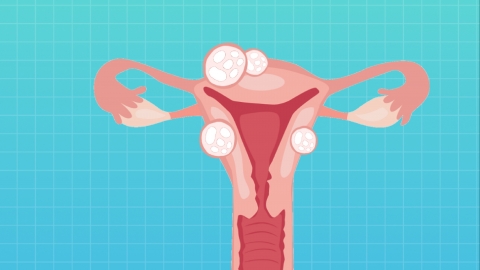What causes uterine fibroids?
Generally, uterine fibroids may be caused by high estrogen levels during the reproductive years, genetic factors, endocrine disorders, chronic endometritis, polycystic ovary syndrome (PCOS), and other factors. It is recommended to seek timely medical consultation, identify the underlying cause, and undergo symptomatic treatment under a doctor's guidance. Detailed explanations are as follows:

1. High estrogen levels during the reproductive years: Women of reproductive age have strong ovarian function and secrete more estrogen. Continuous stimulation of the uterine smooth muscle by estrogen can easily lead to abnormal smooth muscle proliferation and fibroid formation. No special intervention is required. Regular gynecological examinations should be performed to monitor changes in fibroid size. Maintaining a regular lifestyle and avoiding late nights can help reduce hormonal fluctuations.
2. Genetic factors: Women with a family history of uterine fibroids have a higher probability of developing the condition due to genetic predisposition. It is recommended to start regular gynecological ultrasound examinations earlier, at least once per year, for early detection and early intervention. Maintaining a healthy diet and reducing intake of high-fat and high-sugar foods is also important.
3. Endocrine disorders: Long-term mental stress and irregular lifestyle can lead to endocrine imbalance, causing insufficient progesterone secretion and relatively high estrogen levels, which can stimulate the formation of uterine fibroids and may be accompanied by menstrual disorders. Patients may follow medical advice to use hormonal-regulating medications such as mifepristone tablets, danazol capsules, and triptolide capsules.
4. Chronic endometritis: Long-term bacterial or mycoplasma infection of the endometrium can cause chronic inflammation. Repeated inflammation can stimulate the myometrium and increase the risk of fibroids, often accompanied by increased vaginal discharge and mild lower abdominal pain. Patients should follow medical advice to use anti-inflammatory medications such as cefixime capsules, metronidazole tablets, and levofloxacin hydrochloride capsules.
5. Polycystic ovary syndrome: Ovarian dysfunction leads to excessive androgen secretion and ovulation disorders, which in turn cause endocrine disorders and abnormal estrogen metabolism, potentially triggering uterine fibroids, often accompanied by hirsutism and oligomenorrhea. Patients may follow medical advice to use hormonal-regulating medications such as dydrogesterone tablets, ethinylestradiol cyproterone acetate tablets, and spironolactone tablets.
In daily life, maintaining a positive mindset and avoiding prolonged anxiety and stress is important. Diet-wise, eating more fresh vegetables and fruits to supplement vitamins and reducing intake of estrogen-containing health products is recommended. During menstruation, keeping warm, avoiding strenuous exercise, and reducing uterine stimulation are essential for maintaining uterine health.






